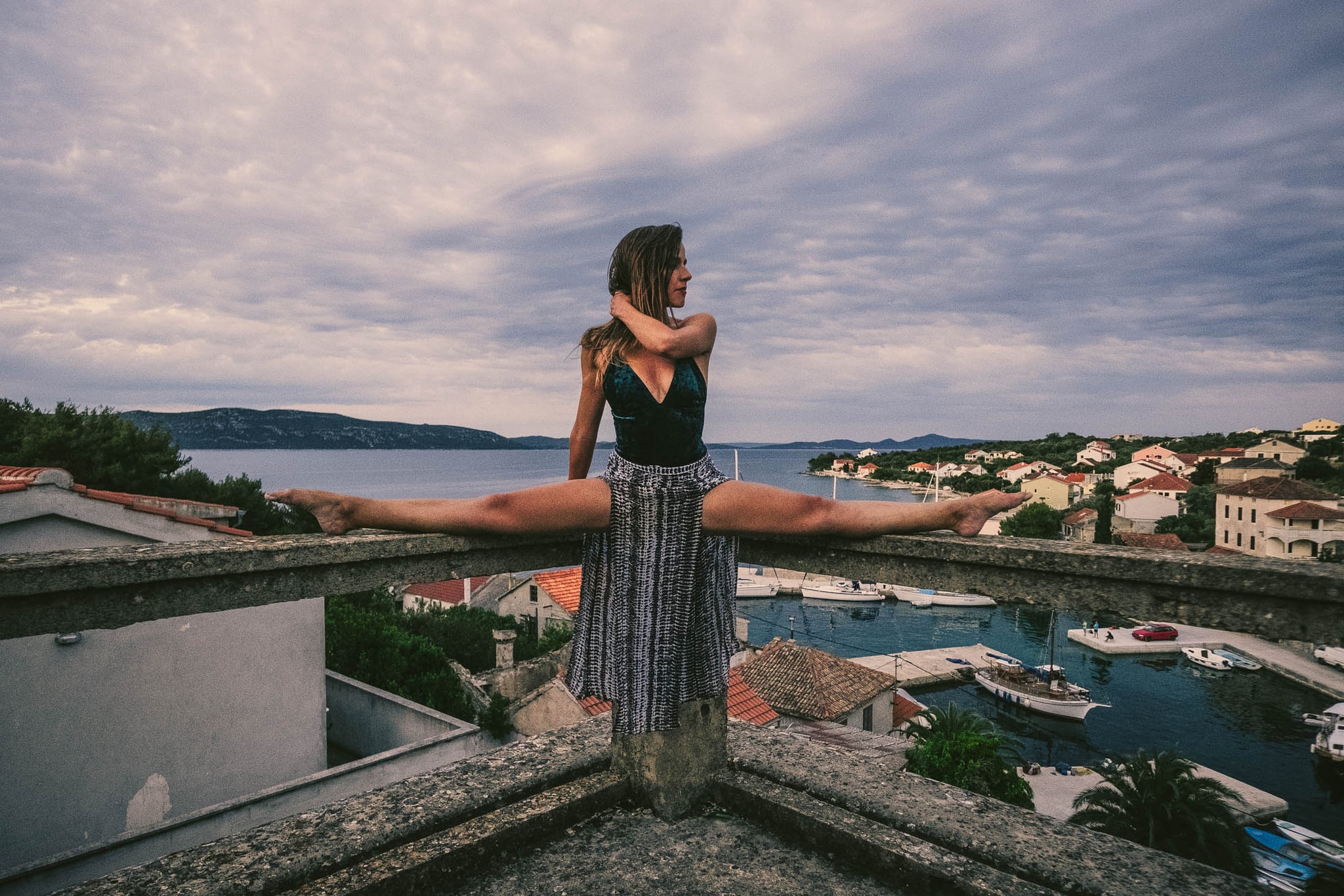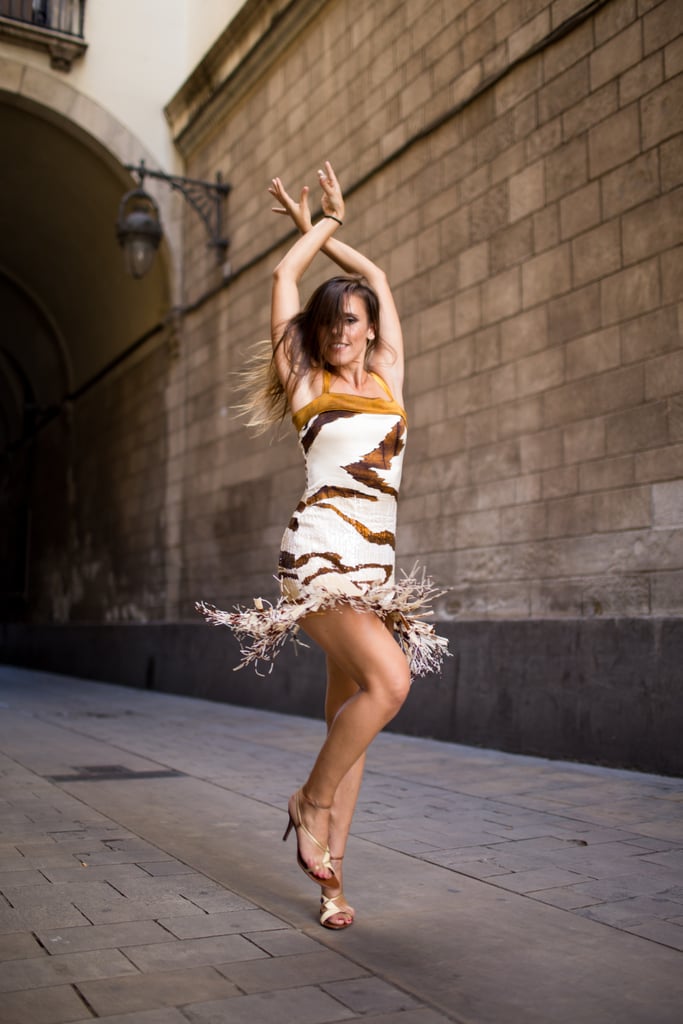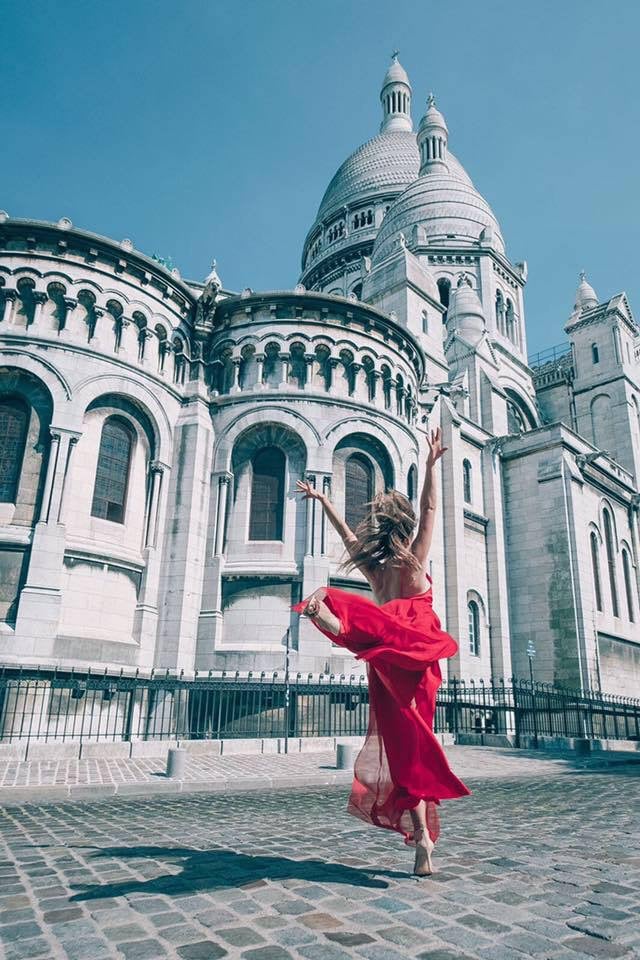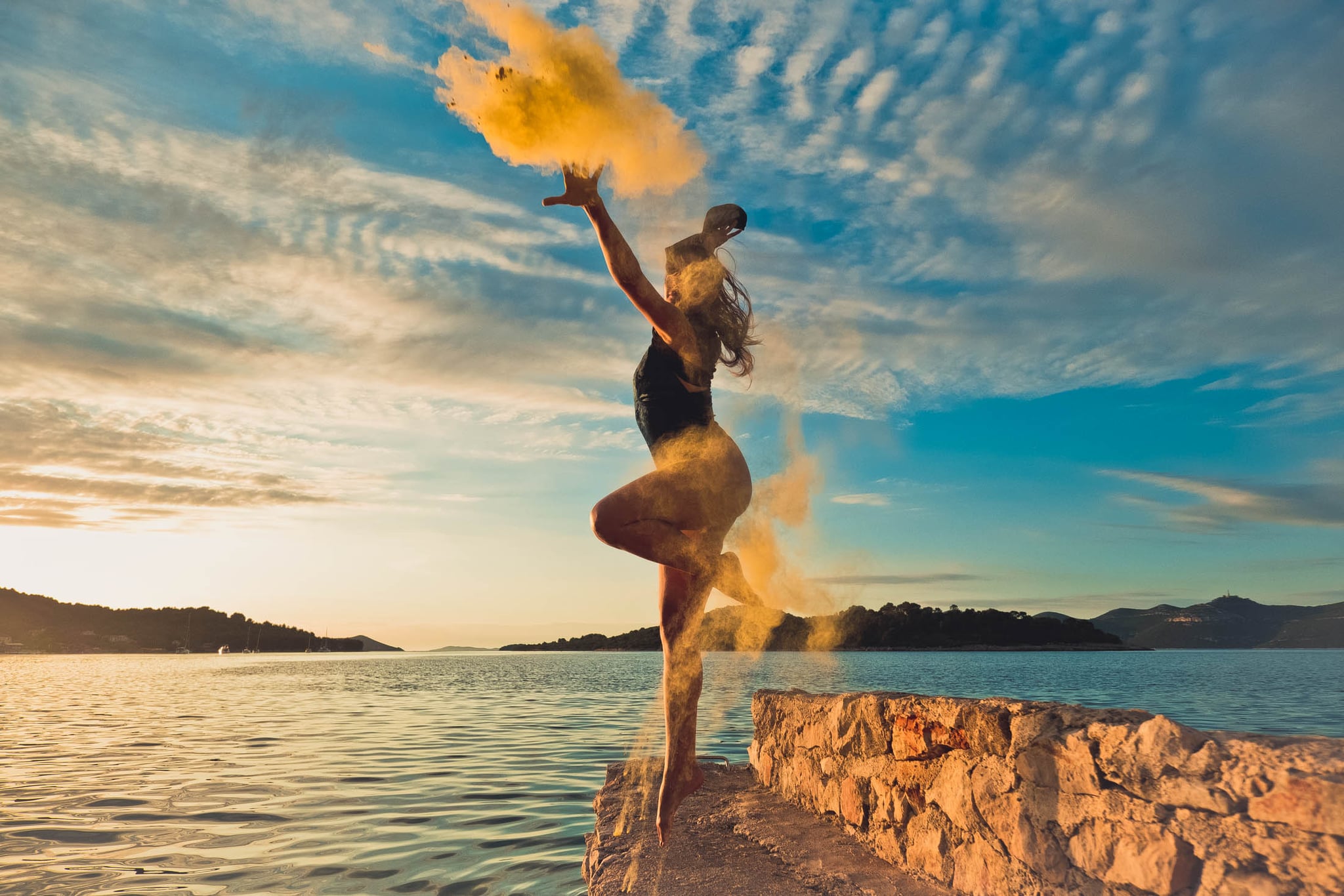
Who Is Vandana Hart?
How Vandana Hart Is Changing the World, One Dance Move at a Time
For dancer and activist Vandana Hart, wandering the world is in her DNA. Born in Moscow to a Russian mother and American father during the Cold War, Vandana's family was one of the first to be reunited after President Ronald Reagan and Soviet leader Mikhail Gorbachev signed a nuclear disarmament agreement. They left as refugees, taking political asylum in Sweden for a year before traveling to India. From there, she and her parents headed to California and then Oregon. After high school, Vandana moved to New York City, where she stayed for all of her 20s.
These days, Vandana, the creator and host of the Netflix series We Speak Dance, considers herself "pretty nomadic." She keeps coming back to Los Angeles — which she says is "the closest place to a home base right now" — but travels internationally every two to three weeks. "The idea of home has always been kind of a fluid concept," she told me over the phone in March. "It's really about the people and those experiences that become home more so than the place."
I first met Vandana in late 2017, during a night out in her "closest place to a home base." I was instantly struck by her easygoing and worldly nature; even before talking to her, I could just tell that she had stories. It doesn't take long to be utterly charmed by her personality and seriously inspired by her life and work, and her message is one that should be heard by as many people as possible.
On Jan. 1, the first season of We Speak Dance premiered on Netflix. The show follows Vandana to five countries — Nigeria, Vietnam, Lebanon, Indonesia, and France — in her quest to learn traditional, religious, and urban dance styles from the locals and discover the ways that movement can bring people together. Dance isn't just a hobby, or even a job, for Vandana: it's a way for her to connect people, places, and cultures and explore the ways in which it can help us express our religion, customs, and sexuality.
Vandana began dancing when she was just 3 years old, with a focus on Afro-Caribbean styles and ballet. "I've always done pretty diverse styles of dance and started training really rigorously with a preprofessional dance company in high school," Vandana said. "We did tap, jazz, African, ballet, hip-hop, [and] salsa and had world-renowned choreographers come and train us. It was part of a desegregation program, so it was the most diverse dance company I've ever seen," she added. "It was like the UN of dance."

Vandana continued her diverse training at the Alvin Ailey Dance Theater while also studying global affairs at NYU. "By day I was training in ballet and contemporary modern, and by night I was learning hip-hop and house dancing from the guys who invented the moves, like the MopTop Crew. It's just been really multilingual, multistyle, multicultural from the beginning," she told me. "Since I was a little kid, it's been normal to dance across 10 different countries in one day."
She also channeled her passion for global activism into a role as an advisor for the UN Women's Global Flagship Initiative "Safe Cities and Safe Public Spaces." While advising the United Nations, she was also a judge on Kenya's version of So You Think You Can Dance — talk about staying busy. By the time Vandana was 23, she had already begun merging her craft with a powerful need to unite people, change lives, and use dance as "a weapon for social change."
Here, Vandana talks about how the concept for We Speak Dance came to be and shares some travel stories from the show. She also opens up about her influences and inspirations and gives advice for using our bodies as tools and our art as revolution.
"We dance to the same drum, so we can all dance on that same beat."
POPSUGAR: How did you come up with the concept for We Speak Dance?
Vandana Hart: We Speak Dance is really a reflection of the way that I was living my life. I realized it was unique and something that I wanted to share with others; I'm just ready to show the power of dance to unify people. Right now there are so many issues of division. We're literally building a wall to separate us from Mexico, and then there's the war in Syria that's been ongoing, and Afghanistan and Iraq and Brexit and all the European countries putting up borders symbolically and literally for refugees. It's just an interesting time for the world — kind of like a pendulum. We go from being really open and global, and then we get really closed off and afraid of each other. And right now is a time where we really need to use creative ways to unite people, and that's the goal of We Speak Dance: to make someone feel empathy for and connected to [another] person and fall in love with their story, because through dance they're invited to do that. I want to create a sense of closeness and familiarity and celebrate diversity and how unique we are, but show that ultimately we all want the same thing. We dance to the same drum, so we can all dance on that same beat.
I came up with this idea of combining dance and politics when I was judging Kenya's version of So You Think You Can Dance as well as working for the UN. I've always separated my world as a dancer and an activist and thought that dance couldn't change the world. I thought dance was very aesthetic and beautiful and artistic, but I felt that it kind of ended with you and your body and the audience. So I pursued a career at the UN to really see if I could make a lasting change. I started teaching women's rights workshops across Africa and Latin America and teaching dance workshops at the same time. That's where this magic happened, and I was making such [a] deeper impact and connection with different communities around the world. It could've been women who've experienced violence; it could be refugee girls; it could be dancers in the favelas in Rio. Whenever I would bring dance into the equation, I just felt that all of a sudden anything was possible and that the starting point was not the problem; the starting was our shared love for movement and art and expression.
PS: What do you most hope to accomplish with the show, especially during such turbulent times?
VH: When you're trying to make a change or uplift yourself in your community, I think starting from a place of celebration and movement and unity is far more profound than talking about all the problems. You have to face them, but sometimes you can get stuck there, and that's where a lot of the social impact and work stops. People hear about all the problems and then everyone gets depressed, and they feel hopeless, and then it just ends. But if we start with our music and our dance and fashion and painting — if we use that to lead [with], then we can actually arrive somewhere together that's better than where we started. I started seeing that with these women in dance workshops. And they became one.
I was traveling and working across 30 countries at the time and started feeling that same sensation in each place. It didn't matter if I was in South Africa or Italy or Brazil or Kenya; I just felt that same deep level of connection. It felt like family. Politics and dance . . . instead of seeing them as separate things, I started seeing them as a whole. And [We Speak Dance] is a powerful way to tap into my potential and share that with other people.
PS: That's so incredible. So, you are obviously a very inspiring person. Who are some of the people who inspire you?
VH: With Parts Unknown, Anthony Bourdain was using food as a way to talk about different sociopolitical issues, and it was really inspiring to see that kind of format. Pharrell [Williams] — his "Happy" music videos went viral at that time, and people became part of this movement of expressing joy through dance. It kind of made this click happen. In terms of the show, the momentum around those two artists and creators was really impactful for me.
There are so many people that have inspired me. The way Alvin Ailey used dance as a revolution to fight for civil rights in the '60s and how that company has risen to be one of the top in the world is really profound. And more recently, Michelle Obama has really been a huge inspiration for me when it comes to redefining female leadership. She really exudes grace and strength and doesn't just redefine leadership for women but can redefine leadership for everyone. Women are starting to step into that and redefine the ways that we organize our country and our politics.
"You know that vision is aligned with what you're meant to be doing when people show up to help you."

PS: You've done so much traveling and met so many people. What's one lesson that you've taken away from everything?
VH: You know you're on to something when your passion becomes much bigger than yourself. I've realized that when you start attracting a whole tribe of people from all over the world who want to join what you're doing, you're on your path. I think we really muscle things and try to force things to happen and become successful. And in the process, we push each other down. But when you're doing something that's positive and meaningful, people will naturally gravitate towards you. My big thing is noticing when people show up and what they show up for and not being afraid of that vision. You know that vision is aligned with what you're meant to be doing when people show up to help you. That's really the only way that We Speak Dance is possible — because people from around the world pulled in like a magnet.
PS: I love that. Do you have a favorite moment from season one?
VH: Oh, man [laughter]. That's so tough. I mean, one of the major highlights was dancing on stage with [Nigerian musician] Femi Kuti. I'm a huge, huge fan of Afrobeat music; [it's] the kind of music that unites people. If I could, I would come back as one of [his father, Nigerian musican] Fela's dancers, so it was such an honor to be able to share the stage with them as they played all these instruments. I honestly traveled back in time. It's like one of those moments where you forget you even have a body. You're just part of this bigger movement and bigger purpose. I learned Afrobeat moves from Fela's daughter, Yeni Kuti. I'm dancing on stage and just having to let go and think about the meaning behind the movements — once you tap into that, you become the superhero. It's very rare that you get to learn a new instrument or new dance move and then immediately get to perform it with the people that are the best at it in the world.

PS: What advice would you give to women who want to get involved in dance activism or help you cultivate a revolution of using art and movement to connect across cultures?
VH: Donating to arts education is something you can do immediately. In terms of We Speak Dance, we're constantly putting on dance protests. You can send in a one-minute video of yourself dancing for a social cause. I think that's so inspirational because then the people who are surrounding that cause will [say], "Oh, wow. People really care about us, and they're thinking about what we're going through, and we can show our unity and our solidity through our art that way." Sometimes dancers feel disempowered, like they can't make a change, but our bodies can be weapons and tools to reimagine the world. We underestimate the power of our bodies as both symbolic and literal tools.
I think inviting other friends to get involved and just showing up if there's a protest or an event or something happening for a social cause is really important in movement building — and if there isn't one happening, create one! Also, when you travel, ask [if there is] an orphanage or a nongovernmental organization that you could share your art with. That could be singing, that could be dancing, that could be painting, poetry, even math skills or science or tech! If all of us shared our talents with communities when we traveled, we'd be making a huge difference. We all have gifts to share.